
Wu Xichun arranges his fossil collection at home in Chengdu, southwest China's Sichuan Province, March 7, 2023.
Wu Xichun is a professor at the College of Energy of the Chengdu University of Technology and an expert in geology.
In the early 1970s, while conducting a geological mapping survey in the northwestern part of Sichuan Province, Wu unexpectedly discovered a reef group formed by Triassic siliceous hexactinellid sponges. Since then, he has devoted himself to the study on sponge reefs for nearly five decades.
In order to study foreign literature, Wu mastered English, Russian, and German, and taught himself Latin, Greek, and Old French. He spent years conducting tens of times of on-site investigations at the discovery area to obtain more accurate research results and brought back dozens of pounds of fossils by himself. To clarify the reproduction and migration of hexactinellid sponges, Wu also brought the fossils abroad for more in-depth comparison studies.
Wu's research has filled the gaps in the geological history of sponge evolution and solved the mystery of the origin of Jurassic siliceous sponges and sponge reef groups in Europe.
"Paleontological fossils are important bases for retracing the history of the Earth. By studying fossils, people can understand the paleogeographic landscape and grasp the laws of Earth's evolution," Wu said. (Xinhua/Liu Kun)

Wu Xichun arranges files with his wife Li Peihua at home in Chengdu, southwest China's Sichuan Province, March 7, 2023.
Wu Xichun is a professor at the College of Energy of the Chengdu University of Technology and an expert in geology.
In the early 1970s, while conducting a geological mapping survey in the northwestern part of Sichuan Province, Wu unexpectedly discovered a reef group formed by Triassic siliceous hexactinellid sponges. Since then, he has devoted himself to the study on sponge reefs for nearly five decades.
In order to study foreign literature, Wu mastered English, Russian, and German, and taught himself Latin, Greek, and Old French. He spent years conducting tens of times of on-site investigations at the discovery area to obtain more accurate research results and brought back dozens of pounds of fossils by himself. To clarify the reproduction and migration of hexactinellid sponges, Wu also brought the fossils abroad for more in-depth comparison studies.
Wu's research has filled the gaps in the geological history of sponge evolution and solved the mystery of the origin of Jurassic siliceous sponges and sponge reef groups in Europe.
"Paleontological fossils are important bases for retracing the history of the Earth. By studying fossils, people can understand the paleogeographic landscape and grasp the laws of Earth's evolution," Wu said. (Xinhua/Liu Kun)
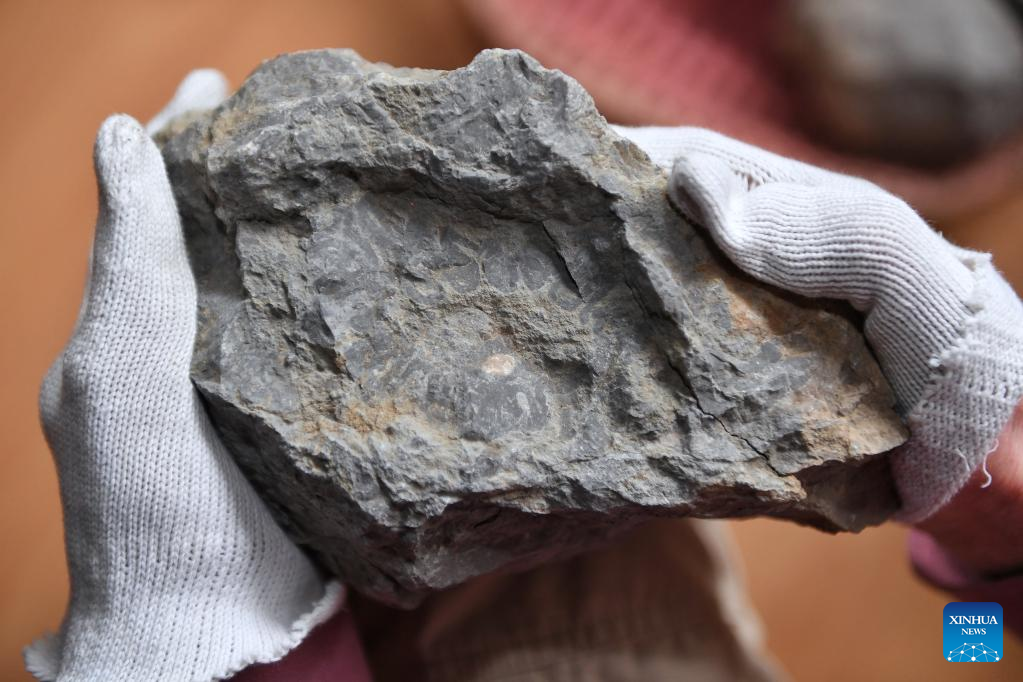
This photo taken on March 7, 2023 shows a fossil of Triassic siliceous sponge collected by Wu Xichun.
Wu Xichun is a professor at the College of Energy of the Chengdu University of Technology and an expert in geology.
In the early 1970s, while conducting a geological mapping survey in the northwestern part of Sichuan Province, Wu unexpectedly discovered a reef group formed by Triassic siliceous hexactinellid sponges. Since then, he has devoted himself to the study on sponge reefs for nearly five decades.
In order to study foreign literature, Wu mastered English, Russian, and German, and taught himself Latin, Greek, and Old French. He spent years conducting tens of times of on-site investigations at the discovery area to obtain more accurate research results and brought back dozens of pounds of fossils by himself. To clarify the reproduction and migration of hexactinellid sponges, Wu also brought the fossils abroad for more in-depth comparison studies.
Wu's research has filled the gaps in the geological history of sponge evolution and solved the mystery of the origin of Jurassic siliceous sponges and sponge reef groups in Europe.
"Paleontological fossils are important bases for retracing the history of the Earth. By studying fossils, people can understand the paleogeographic landscape and grasp the laws of Earth's evolution," Wu said. (Xinhua/Liu Kun)
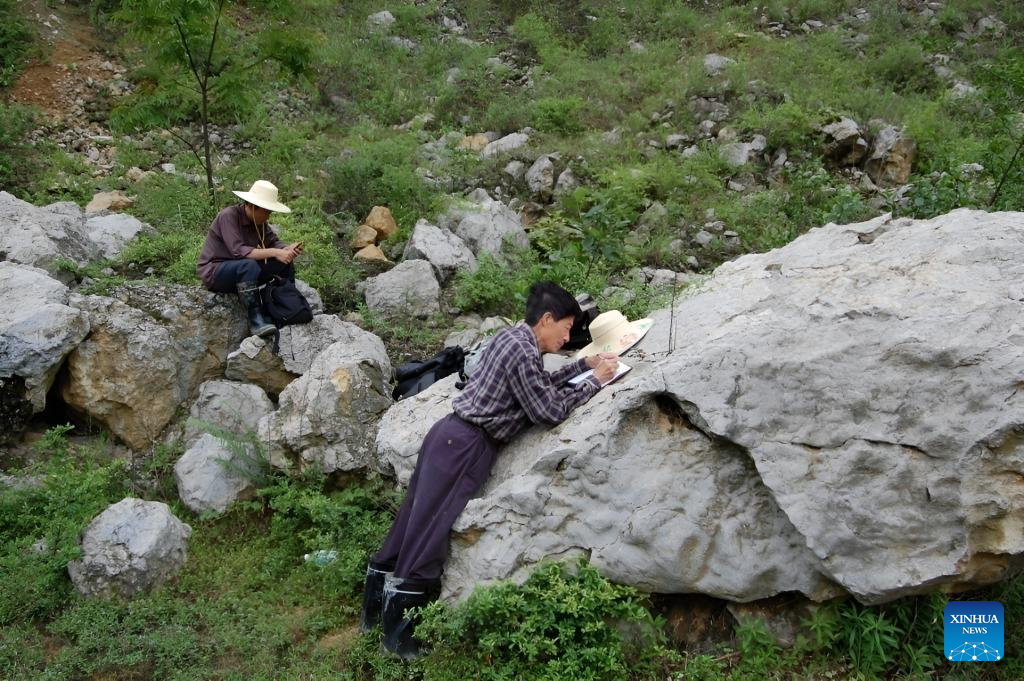
This file photo taken in 2008 shows Wu Xichun (R) conducting field research in the northwestern part of Sichuan Province, southwest China.
Wu Xichun is a professor at the College of Energy of the Chengdu University of Technology and an expert in geology.
In the early 1970s, while conducting a geological mapping survey in the northwestern part of Sichuan Province, Wu unexpectedly discovered a reef group formed by Triassic siliceous hexactinellid sponges. Since then, he has devoted himself to the study on sponge reefs for nearly five decades.
In order to study foreign literature, Wu mastered English, Russian, and German, and taught himself Latin, Greek, and Old French. He spent years conducting tens of times of on-site investigations at the discovery area to obtain more accurate research results and brought back dozens of pounds of fossils by himself. To clarify the reproduction and migration of hexactinellid sponges, Wu also brought the fossils abroad for more in-depth comparison studies.
Wu's research has filled the gaps in the geological history of sponge evolution and solved the mystery of the origin of Jurassic siliceous sponges and sponge reef groups in Europe.
"Paleontological fossils are important bases for retracing the history of the Earth. By studying fossils, people can understand the paleogeographic landscape and grasp the laws of Earth's evolution," Wu said. (Xinhua)
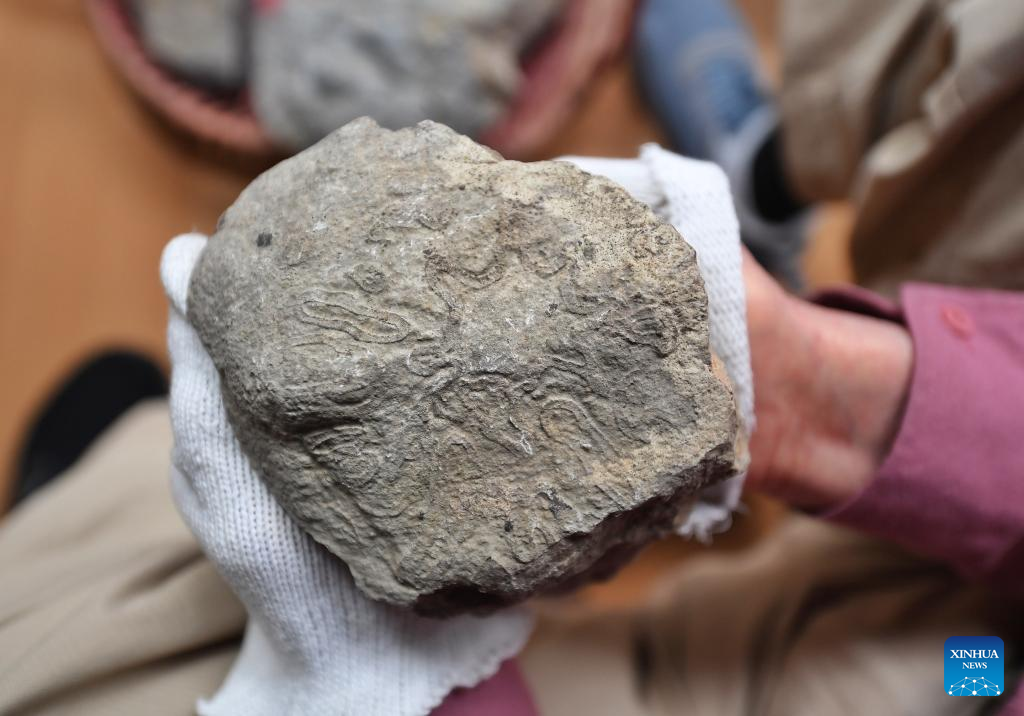
This photo taken on March 7, 2023 shows a fossil of Triassic siliceous sponge collected by Wu Xichun.
Wu Xichun is a professor at the College of Energy of the Chengdu University of Technology and an expert in geology.
In the early 1970s, while conducting a geological mapping survey in the northwestern part of Sichuan Province, Wu unexpectedly discovered a reef group formed by Triassic siliceous hexactinellid sponges. Since then, he has devoted himself to the study on sponge reefs for nearly five decades.
In order to study foreign literature, Wu mastered English, Russian, and German, and taught himself Latin, Greek, and Old French. He spent years conducting tens of times of on-site investigations at the discovery area to obtain more accurate research results and brought back dozens of pounds of fossils by himself. To clarify the reproduction and migration of hexactinellid sponges, Wu also brought the fossils abroad for more in-depth comparison studies.
Wu's research has filled the gaps in the geological history of sponge evolution and solved the mystery of the origin of Jurassic siliceous sponges and sponge reef groups in Europe.
"Paleontological fossils are important bases for retracing the history of the Earth. By studying fossils, people can understand the paleogeographic landscape and grasp the laws of Earth's evolution," Wu said. (Xinhua/Liu Kun)

Wu Xichun looks through a book at home in Chengdu, southwest China's Sichuan Province, March 7, 2023.
Wu Xichun is a professor at the College of Energy of the Chengdu University of Technology and an expert in geology.
In the early 1970s, while conducting a geological mapping survey in the northwestern part of Sichuan Province, Wu unexpectedly discovered a reef group formed by Triassic siliceous hexactinellid sponges. Since then, he has devoted himself to the study on sponge reefs for nearly five decades.
In order to study foreign literature, Wu mastered English, Russian, and German, and taught himself Latin, Greek, and Old French. He spent years conducting tens of times of on-site investigations at the discovery area to obtain more accurate research results and brought back dozens of pounds of fossils by himself. To clarify the reproduction and migration of hexactinellid sponges, Wu also brought the fossils abroad for more in-depth comparison studies.
Wu's research has filled the gaps in the geological history of sponge evolution and solved the mystery of the origin of Jurassic siliceous sponges and sponge reef groups in Europe.
"Paleontological fossils are important bases for retracing the history of the Earth. By studying fossils, people can understand the paleogeographic landscape and grasp the laws of Earth's evolution," Wu said. (Xinhua/Liu Kun)
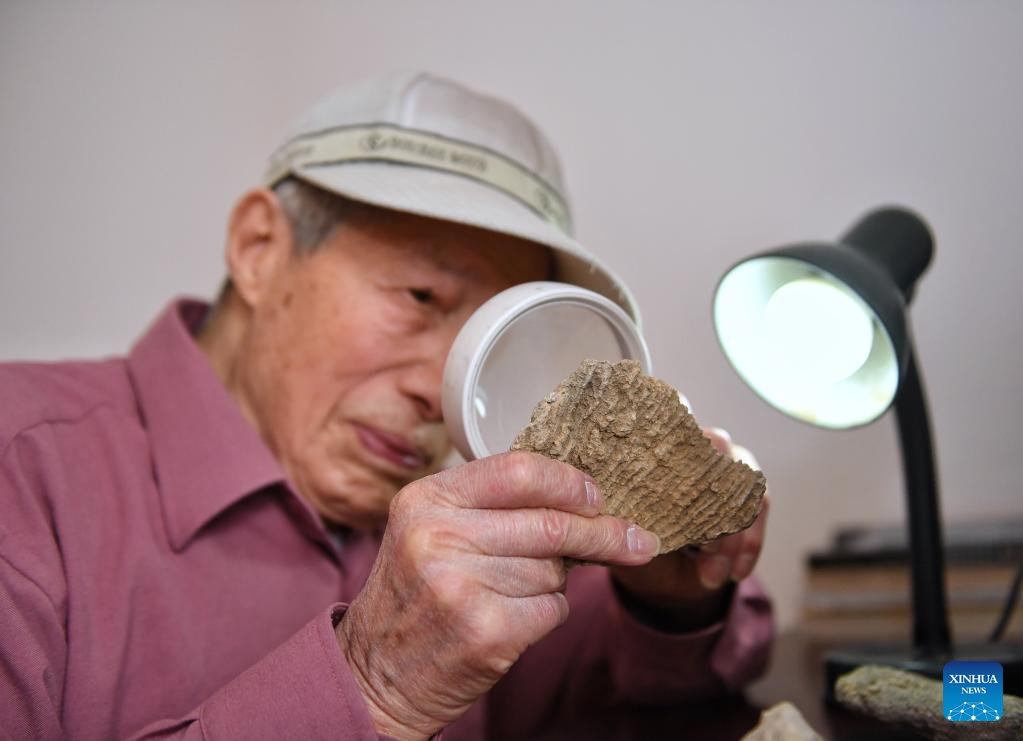
Wu Xichun observes a fossil fragment of Triassic siliceous sponge at home in Chengdu, southwest China's Sichuan Province, March 7, 2023.
Wu Xichun is a professor at the College of Energy of the Chengdu University of Technology and an expert in geology.
In the early 1970s, while conducting a geological mapping survey in the northwestern part of Sichuan Province, Wu unexpectedly discovered a reef group formed by Triassic siliceous hexactinellid sponges. Since then, he has devoted himself to the study on sponge reefs for nearly five decades.
In order to study foreign literature, Wu mastered English, Russian, and German, and taught himself Latin, Greek, and Old French. He spent years conducting tens of times of on-site investigations at the discovery area to obtain more accurate research results and brought back dozens of pounds of fossils by himself. To clarify the reproduction and migration of hexactinellid sponges, Wu also brought the fossils abroad for more in-depth comparison studies.
Wu's research has filled the gaps in the geological history of sponge evolution and solved the mystery of the origin of Jurassic siliceous sponges and sponge reef groups in Europe.
"Paleontological fossils are important bases for retracing the history of the Earth. By studying fossils, people can understand the paleogeographic landscape and grasp the laws of Earth's evolution," Wu said. (Xinhua/Liu Kun)
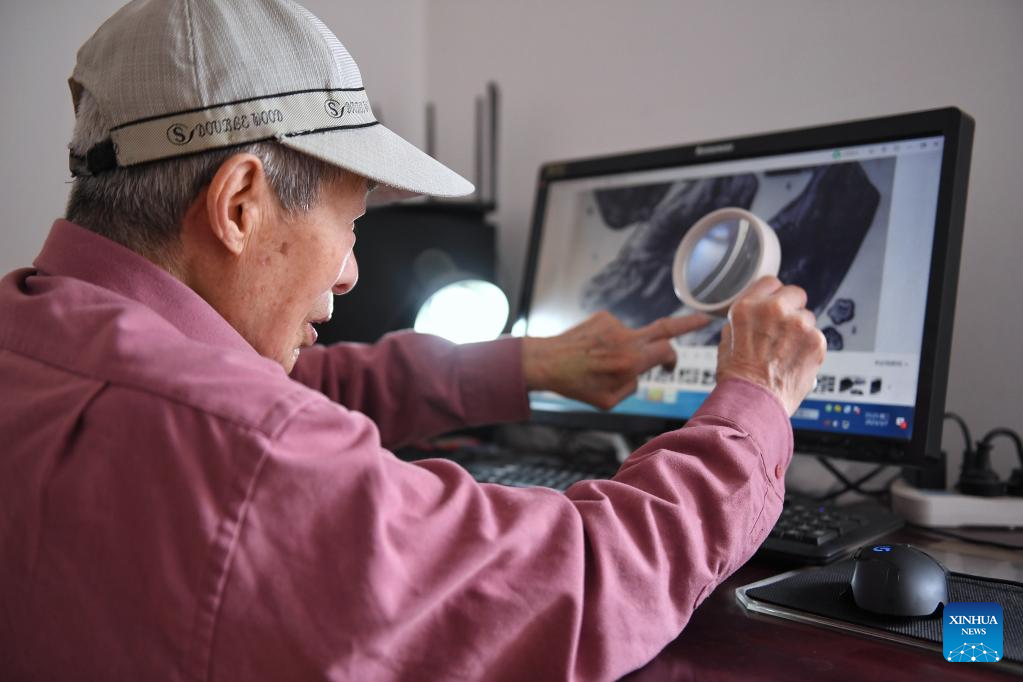
Wu Xichun observes a photo of sponge fossil at home in Chengdu, southwest China's Sichuan Province, March 7, 2023.
Wu Xichun is a professor at the College of Energy of the Chengdu University of Technology and an expert in geology.
In the early 1970s, while conducting a geological mapping survey in the northwestern part of Sichuan Province, Wu unexpectedly discovered a reef group formed by Triassic siliceous hexactinellid sponges. Since then, he has devoted himself to the study on sponge reefs for nearly five decades.
In order to study foreign literature, Wu mastered English, Russian, and German, and taught himself Latin, Greek, and Old French. He spent years conducting tens of times of on-site investigations at the discovery area to obtain more accurate research results and brought back dozens of pounds of fossils by himself. To clarify the reproduction and migration of hexactinellid sponges, Wu also brought the fossils abroad for more in-depth comparison studies.
Wu's research has filled the gaps in the geological history of sponge evolution and solved the mystery of the origin of Jurassic siliceous sponges and sponge reef groups in Europe.
"Paleontological fossils are important bases for retracing the history of the Earth. By studying fossils, people can understand the paleogeographic landscape and grasp the laws of Earth's evolution," Wu said. (Xinhua/Liu Kun)
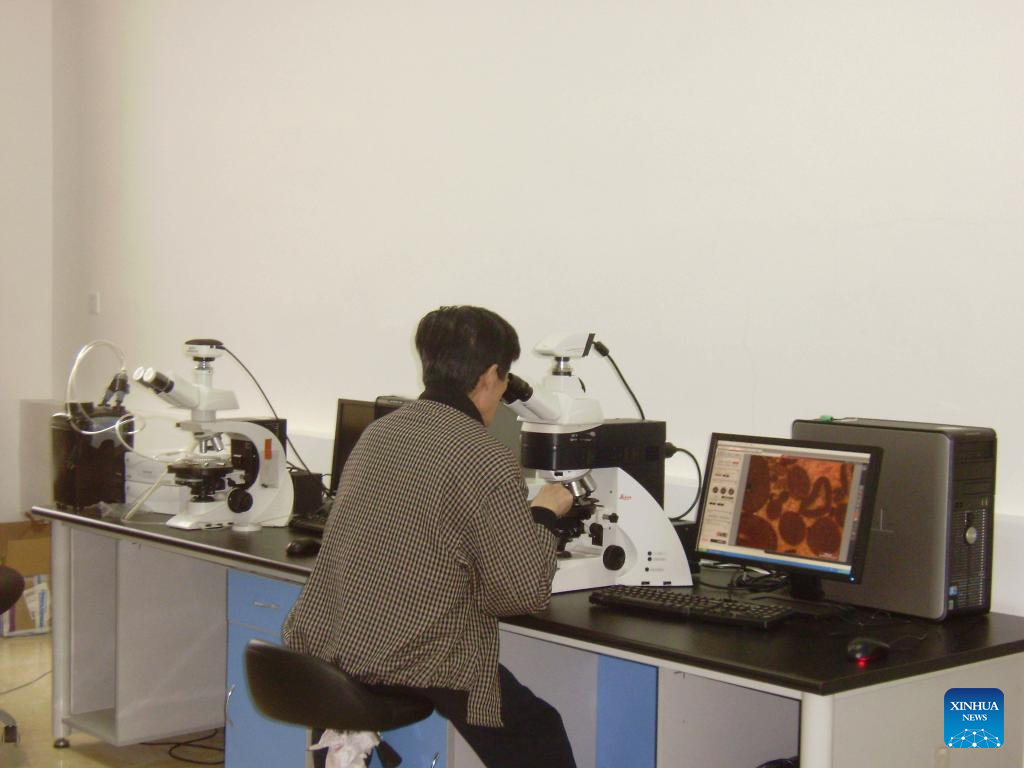
This file photo taken in 2011 shows Wu Xichun observing a slice of a fossil sponge with a microscope at the laboratory.
Wu Xichun is a professor at the College of Energy of the Chengdu University of Technology and an expert in geology.
In the early 1970s, while conducting a geological mapping survey in the northwestern part of Sichuan Province, Wu unexpectedly discovered a reef group formed by Triassic siliceous hexactinellid sponges. Since then, he has devoted himself to the study on sponge reefs for nearly five decades.
In order to study foreign literature, Wu mastered English, Russian, and German, and taught himself Latin, Greek, and Old French. He spent years conducting tens of times of on-site investigations at the discovery area to obtain more accurate research results and brought back dozens of pounds of fossils by himself. To clarify the reproduction and migration of hexactinellid sponges, Wu also brought the fossils abroad for more in-depth comparison studies.
Wu's research has filled the gaps in the geological history of sponge evolution and solved the mystery of the origin of Jurassic siliceous sponges and sponge reef groups in Europe.
"Paleontological fossils are important bases for retracing the history of the Earth. By studying fossils, people can understand the paleogeographic landscape and grasp the laws of Earth's evolution," Wu said. (Xinhua)
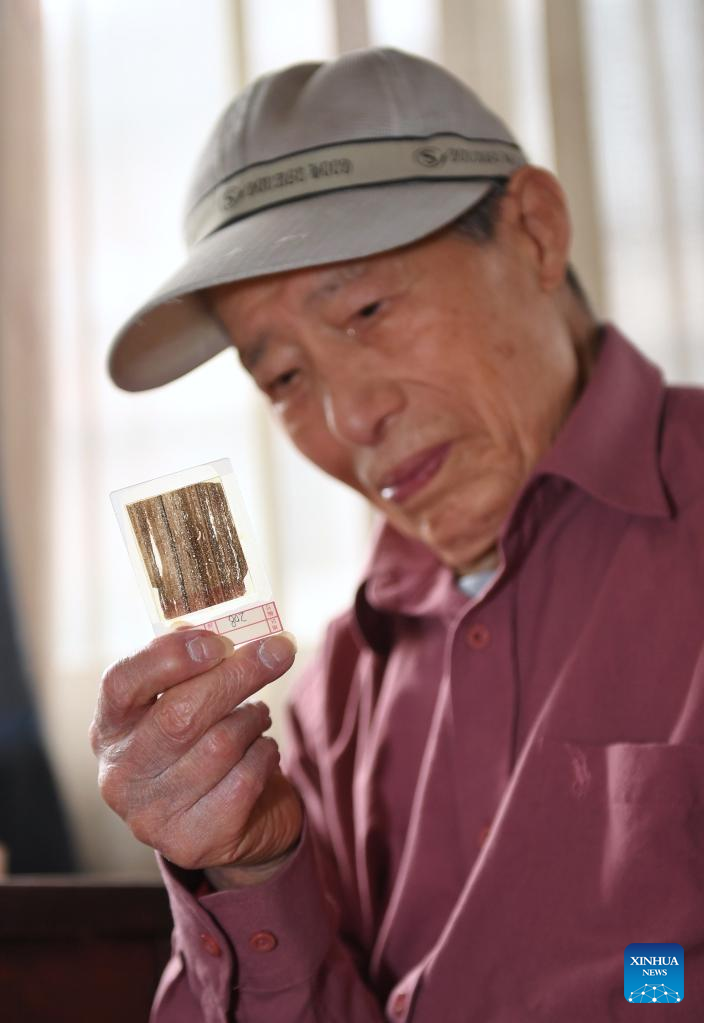
Wu Xichun observes a fossil slice of siliceous hexactinellid sponge at home in Chengdu, southwest China's Sichuan Province, March 7, 2023.
Wu Xichun is a professor at the College of Energy of the Chengdu University of Technology and an expert in geology.
In the early 1970s, while conducting a geological mapping survey in the northwestern part of Sichuan Province, Wu unexpectedly discovered a reef group formed by Triassic siliceous hexactinellid sponges. Since then, he has devoted himself to the study on sponge reefs for nearly five decades.
In order to study foreign literature, Wu mastered English, Russian, and German, and taught himself Latin, Greek, and Old French. He spent years conducting tens of times of on-site investigations at the discovery area to obtain more accurate research results and brought back dozens of pounds of fossils by himself. To clarify the reproduction and migration of hexactinellid sponges, Wu also brought the fossils abroad for more in-depth comparison studies.
Wu's research has filled the gaps in the geological history of sponge evolution and solved the mystery of the origin of Jurassic siliceous sponges and sponge reef groups in Europe.
"Paleontological fossils are important bases for retracing the history of the Earth. By studying fossils, people can understand the paleogeographic landscape and grasp the laws of Earth's evolution," Wu said. (Xinhua/Liu Kun)
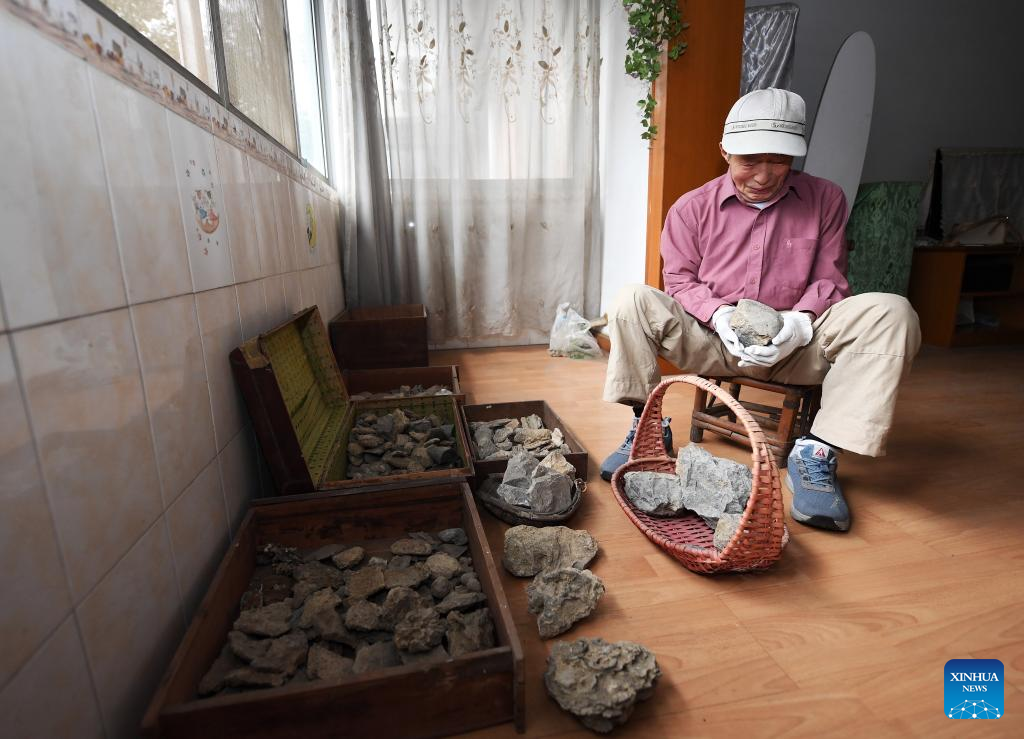
Wu Xichun arranges his fossil collection at home in Chengdu, southwest China's Sichuan Province, March 7, 2023.
Wu Xichun is a professor at the College of Energy of the Chengdu University of Technology and an expert in geology.
In the early 1970s, while conducting a geological mapping survey in the northwestern part of Sichuan Province, Wu unexpectedly discovered a reef group formed by Triassic siliceous hexactinellid sponges. Since then, he has devoted himself to the study on sponge reefs for nearly five decades.
In order to study foreign literature, Wu mastered English, Russian, and German, and taught himself Latin, Greek, and Old French. He spent years conducting tens of times of on-site investigations at the discovery area to obtain more accurate research results and brought back dozens of pounds of fossils by himself. To clarify the reproduction and migration of hexactinellid sponges, Wu also brought the fossils abroad for more in-depth comparison studies.
Wu's research has filled the gaps in the geological history of sponge evolution and solved the mystery of the origin of Jurassic siliceous sponges and sponge reef groups in Europe.
"Paleontological fossils are important bases for retracing the history of the Earth. By studying fossils, people can understand the paleogeographic landscape and grasp the laws of Earth's evolution," Wu said. (Xinhua/Liu Kun)

Wu Xichun looks through a book at home in Chengdu, southwest China's Sichuan Province, March 7, 2023.
Wu Xichun is a professor at the College of Energy of the Chengdu University of Technology and an expert in geology.
In the early 1970s, while conducting a geological mapping survey in the northwestern part of Sichuan Province, Wu unexpectedly discovered a reef group formed by Triassic siliceous hexactinellid sponges. Since then, he has devoted himself to the study on sponge reefs for nearly five decades.
In order to study foreign literature, Wu mastered English, Russian, and German, and taught himself Latin, Greek, and Old French. He spent years conducting tens of times of on-site investigations at the discovery area to obtain more accurate research results and brought back dozens of pounds of fossils by himself. To clarify the reproduction and migration of hexactinellid sponges, Wu also brought the fossils abroad for more in-depth comparison studies.
Wu's research has filled the gaps in the geological history of sponge evolution and solved the mystery of the origin of Jurassic siliceous sponges and sponge reef groups in Europe.
"Paleontological fossils are important bases for retracing the history of the Earth. By studying fossils, people can understand the paleogeographic landscape and grasp the laws of Earth's evolution," Wu said. (Xinhua/Liu Kun)
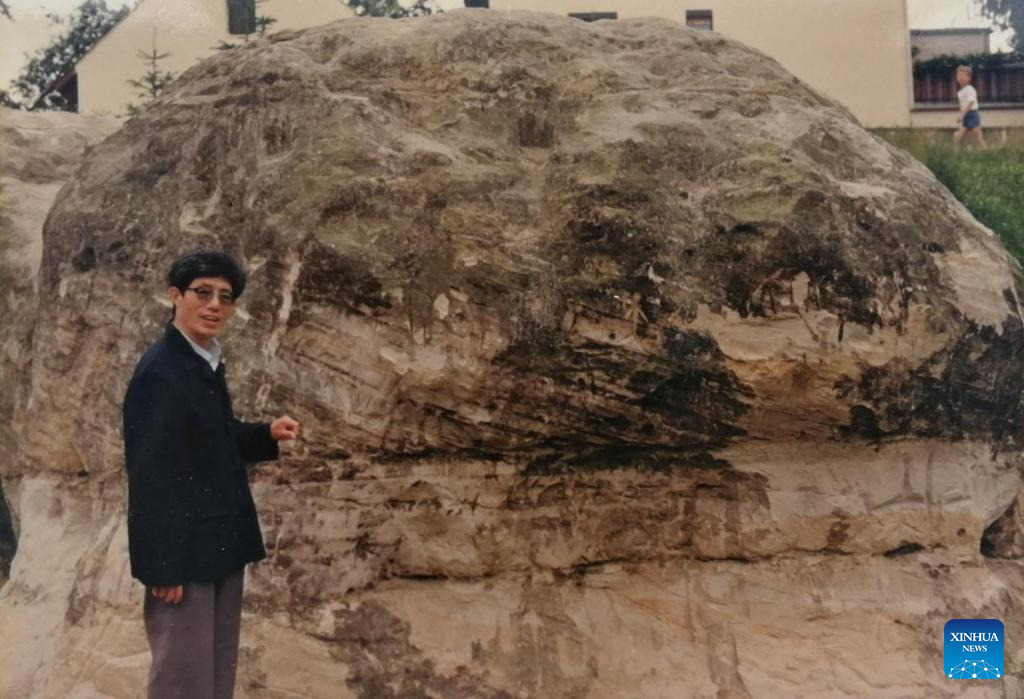
This file photo taken in 1987 shows Wu Xichun investigating a Jurassic siliceous sponge reef group in Germany.
Wu Xichun is a professor at the College of Energy of the Chengdu University of Technology and an expert in geology.
In the early 1970s, while conducting a geological mapping survey in the northwestern part of Sichuan Province, Wu unexpectedly discovered a reef group formed by Triassic siliceous hexactinellid sponges. Since then, he has devoted himself to the study on sponge reefs for nearly five decades.
In order to study foreign literature, Wu mastered English, Russian, and German, and taught himself Latin, Greek, and Old French. He spent years conducting tens of times of on-site investigations at the discovery area to obtain more accurate research results and brought back dozens of pounds of fossils by himself. To clarify the reproduction and migration of hexactinellid sponges, Wu also brought the fossils abroad for more in-depth comparison studies.
Wu's research has filled the gaps in the geological history of sponge evolution and solved the mystery of the origin of Jurassic siliceous sponges and sponge reef groups in Europe.
"Paleontological fossils are important bases for retracing the history of the Earth. By studying fossils, people can understand the paleogeographic landscape and grasp the laws of Earth's evolution," Wu said. (Xinhua)

Wu Xichun (L) and his wife Li Peihua walks in the campus of Chengdu University of Technology in Chengdu, southwest China's Sichuan Province, Feb. 27, 2023.
Wu Xichun is a professor at the College of Energy of the Chengdu University of Technology and an expert in geology.
In the early 1970s, while conducting a geological mapping survey in the northwestern part of Sichuan Province, Wu unexpectedly discovered a reef group formed by Triassic siliceous hexactinellid sponges. Since then, he has devoted himself to the study on sponge reefs for nearly five decades.
In order to study foreign literature, Wu mastered English, Russian, and German, and taught himself Latin, Greek, and Old French. He spent years conducting tens of times of on-site investigations at the discovery area to obtain more accurate research results and brought back dozens of pounds of fossils by himself. To clarify the reproduction and migration of hexactinellid sponges, Wu also brought the fossils abroad for more in-depth comparison studies.
Wu's research has filled the gaps in the geological history of sponge evolution and solved the mystery of the origin of Jurassic siliceous sponges and sponge reef groups in Europe.
"Paleontological fossils are important bases for retracing the history of the Earth. By studying fossils, people can understand the paleogeographic landscape and grasp the laws of Earth's evolution," Wu said. (Xinhua/Liu Kun)

Wu Xichun arranges files at home in Chengdu, southwest China's Sichuan Province, March 7, 2023.
Wu Xichun is a professor at the College of Energy of the Chengdu University of Technology and an expert in geology.
In the early 1970s, while conducting a geological mapping survey in the northwestern part of Sichuan Province, Wu unexpectedly discovered a reef group formed by Triassic siliceous hexactinellid sponges. Since then, he has devoted himself to the study on sponge reefs for nearly five decades.
In order to study foreign literature, Wu mastered English, Russian, and German, and taught himself Latin, Greek, and Old French. He spent years conducting tens of times of on-site investigations at the discovery area to obtain more accurate research results and brought back dozens of pounds of fossils by himself. To clarify the reproduction and migration of hexactinellid sponges, Wu also brought the fossils abroad for more in-depth comparison studies.
Wu's research has filled the gaps in the geological history of sponge evolution and solved the mystery of the origin of Jurassic siliceous sponges and sponge reef groups in Europe.
"Paleontological fossils are important bases for retracing the history of the Earth. By studying fossils, people can understand the paleogeographic landscape and grasp the laws of Earth's evolution," Wu said. (Xinhua/Liu Kun)

This file photo taken in 1974 shows Wu Xichun (C) conducting field research in the northwestern part of Sichuan Province, southwest China.
Wu Xichun is a professor at the College of Energy of the Chengdu University of Technology and an expert in geology.
In the early 1970s, while conducting a geological mapping survey in the northwestern part of Sichuan Province, Wu unexpectedly discovered a reef group formed by Triassic siliceous hexactinellid sponges. Since then, he has devoted himself to the study on sponge reefs for nearly five decades.
In order to study foreign literature, Wu mastered English, Russian, and German, and taught himself Latin, Greek, and Old French. He spent years conducting tens of times of on-site investigations at the discovery area to obtain more accurate research results and brought back dozens of pounds of fossils by himself. To clarify the reproduction and migration of hexactinellid sponges, Wu also brought the fossils abroad for more in-depth comparison studies.
Wu's research has filled the gaps in the geological history of sponge evolution and solved the mystery of the origin of Jurassic siliceous sponges and sponge reef groups in Europe.
"Paleontological fossils are important bases for retracing the history of the Earth. By studying fossils, people can understand the paleogeographic landscape and grasp the laws of Earth's evolution," Wu said. (Xinhua)



